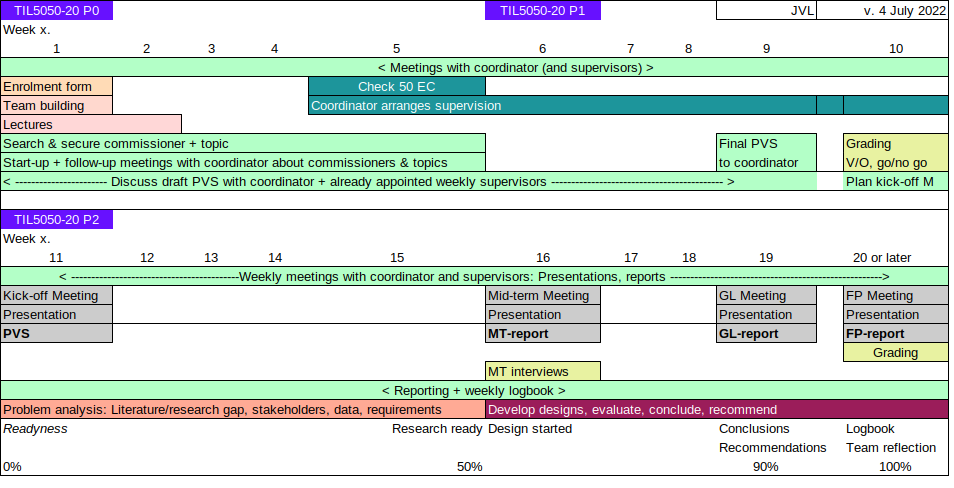TIL Design Project
About
Working on complex problems asks for interdisciplinary teams. A successful team uses the knowledge (theories, methodologies, tools) and (social and technical) skills from all its members to develop alternatives ('solutions') that cannot be found by most individuals. These solutions and the way you develop them shall have real practical value for your commissioner and sufficient academic relevance. A recurring challenge is to match your own ideas with the requirements from your commissioner and the TU Delft.
A design challenge
Design has been defined as "an open-ended and iil-structured process (..) with no unique solution and the candidate solutions cannot be generated with an algorithm." A design/systems engineering method should be used "to support decision making and trade-offs among competing possible solutions. Algorithms and mathematical formulations cannot replace the qualitative research tasks (such as stakeholder and requirements analysis), but they can be used later in the design process."
"The lack of structure and inadequacy of mathematical tools leads to the use of conceptual analysis in the first stage of the design process." (reference)
Interdisciplinary teamwork
A TIL Design project is a final test in interdisciplinary collaboration and a very useful preparation for your thesis project, as the way of handling things is largely similar, while you can (still) benefit from each other and improve your individual skills. Teams consist of 4-5 students with different bachelor and master specialisations, preferably (not mandatory) different gender categories and cultural backgrounds.
Assignments and internships
Each project has a preparation period of 5+5 weeks (P0 + P1) in which you have to secure a commissioner and a topic and write a full project proposal (PVS). This is followed by another 10-12 weeks (P2) during which you work together on the assignment.
A key challenge is that you have to attract a project from a company or government agency as there are no internal or repetitive projects offered. Many of you may have worked for a company, but not necessarily in the Netherlands and not in a role as professional. Your project is actually a part-time joint (and paid) internship experience. You gain (additional) work experience and will be treated as a fellow worker. All in all, each project offers an invaluable experience, completely different from earlier BSc or MSc projects.
About methodology
The core methodology is always systems engineering. You choose a design method up front and apply this transparently and rigorously. This helps you to see a problem as part of a larger system, to scope your project, to find the root causes of the problem and to develop design requirements, constraints and kpi. These help you to finetune and evaluate your designs. You use several other methods and tools in the problem analysis phase and in the design phase.
The problem analysis deals with the what and why questions related with the problem. The design phase is meant to develop a few alternative ways of working in the organisation in order to mitigate / 'solve' its problems. If you develop a tool like a model, then this is just a tool to test the assumptions and possible effects of your designs (proof of concept), not the primary goal of the project. The same holds for a tool like scenario analysis.
Any method should be applied in a rigorous and transparent manner. The solutions should be applicable in practice and, once implemented, help to solve or mitigate the perceived problem(s) of your commissioner. What you deliver should work under given conditions.
The aim of the course is not to learn new theories or methods. You learn to apply what you learned in earlier courses in a real life setting. You will also experience how students from different specialisations apply their knowledge and skills and learn and benefit from that, just as they will learn and benefit from your contribution.
Coaching
A Design project is intended to ‘mimic’ a real-life project experience. The project is an externally monitored, but not managed project. This means that some team members have to act as project and process manager. Weekly coaching is offered by 1-2 supervisors with UTQ working in the TIL domain. The commissioner should also provide at least 1 supervisor.
Workload
This 10 EC course is very time consuming. It takes at least 2,5 days, sometimes 3,5 days per week. This is why it is scheduled in the second year of the TIL master (no exceptions). The team can decide where to work, but it is essential that each member works at least 1 day at the office of the company or agency.
More information
Course management
As responsible instructor, dr. Jaap Vleugel is your key contact. He will support each project from its inception until its finish.
Brightspace
Detailed information, including past projects and commissioner contact data can be found on Brightspace.
Enrolment
Enrolment and planning.
Rules
Article 7 of the TER MSc TIL 2024-2025 applies. Individual enrolment forms are accepted if
- Course TIL4030-20 is passed completely;
- At least 50 EC was received from completed courses at the first day of the fifth week of the educational period in which the project starts;
- The regular enrolment procedure is followed.
The course is offered in Q1-Q2, Q2-Q3 and Q3-Q4. Q4-Q1 is only offered if a team can be composed with the required minimum number of 4 students. Each team member should fulfill the enrolment requirements.
The course is not available as an elective and exclusively offered to MSc TIL students. There are no exceptions. This also holds for exchange students. It can not be replaced by another interdisciplinary or multidisciplinary course or courses either from the TU Delft or elsewhere.
